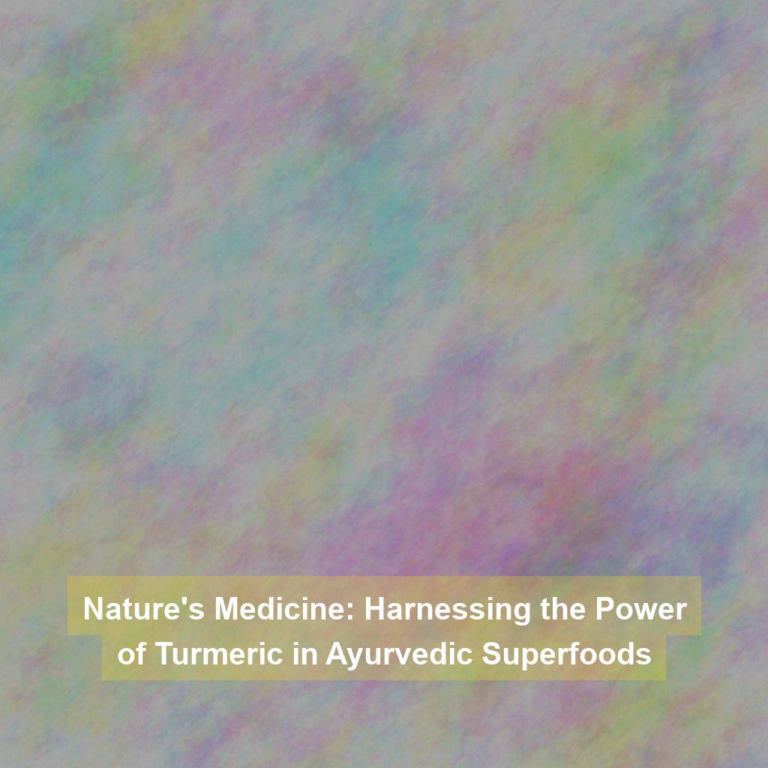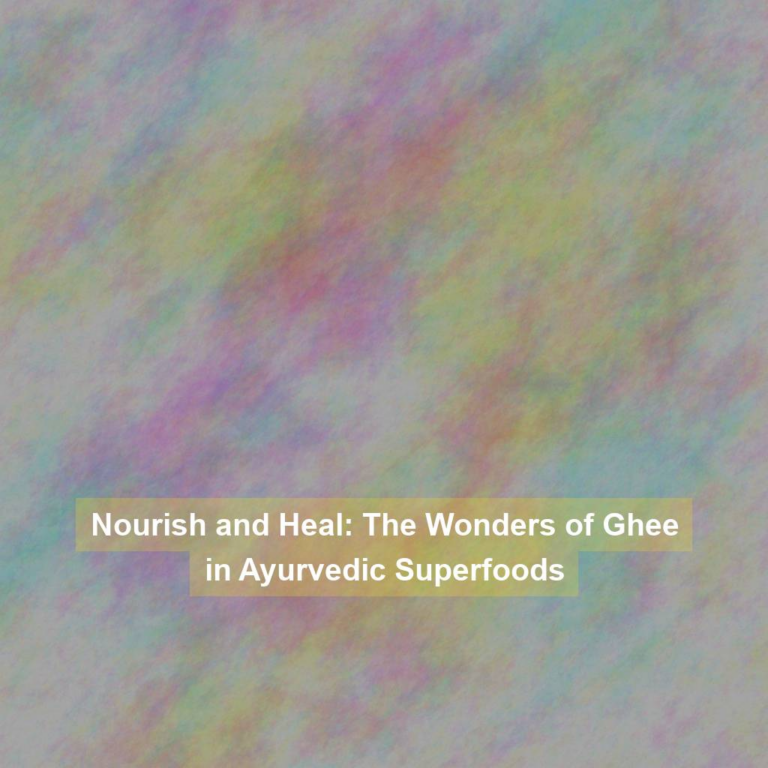Did you know that turmeric, a key ingredient in Ayurvedic superfoods, has been used for over 4,000 years in traditional medicine? Its active compound, curcumin, has been the subject of over 6,000 scientific studies for its potential health benefits.
But what exactly makes this golden spice so remarkable in transforming health and well-being? Let’s explore how turmeric can revolutionize your approach to wellness and vitality in ways you never imagined.
Understanding Ayurvedic Superfoods
To understand Ayurvedic superfoods, it’s essential to explore their traditional uses and modern applications in promoting overall well-being. Ayurveda, an ancient Indian system of medicine, emphasizes the use of natural ingredients to maintain health and prevent diseases. Superfoods in Ayurveda are selected based on their ability to balance the body’s doshas, or energies, leading to improved physical and mental health.
In Ayurveda, superfoods like turmeric, ashwagandha, and ghee have been used for centuries to promote well-being. Turmeric, with its active compound curcumin, is known for its anti-inflammatory and antioxidant properties. It has been traditionally used to support joint health, aid digestion, and promote radiant skin. Ashwagandha, an adaptogenic herb, is valued for its ability to combat stress and promote vitality. Ghee, a type of clarified butter, is utilized for its nourishing and lubricating qualities.
In the modern context, Ayurvedic superfoods have gained popularity for their holistic approach to health. Turmeric lattes, ashwagandha supplements, and ghee-based products have become prevalent in the health and wellness industry, offering natural alternatives to support overall well-being. Understanding the traditional uses and contemporary applications of Ayurvedic superfoods can empower you to make informed choices for enhancing your health.
The Health Benefits of Turmeric
Turmeric’s active compound curcumin provides anti-inflammatory and antioxidant properties, offering numerous health benefits. Incorporating turmeric into your diet can help reduce inflammation, which is linked to various chronic conditions such as heart disease, cancer, and diabetes.
Curcumin’s antioxidant properties also play a crucial role in neutralizing free radicals, thereby potentially protecting your cells from damage and reducing the risk of chronic diseases. Moreover, turmeric has been shown to support brain health by promoting the production of brain-derived neurotrophic factor (BDNF), a growth hormone that may aid in delaying or even reversing age-related cognitive decline.
Its anti-inflammatory effects can also alleviate symptoms of arthritis and other inflammatory joint conditions, offering natural relief. Additionally, turmeric’s potential to improve digestive health is noteworthy, as it can help alleviate symptoms of irritable bowel syndrome (IBS) and promote overall gut health.
Embracing turmeric as part of your daily routine can contribute to enhancing your overall well-being and vitality.
Incorporating Turmeric Into Your Diet
Consider incorporating turmeric into your diet by adding it to your favorite recipes for an easy and flavorful way to enjoy its health benefits. Start your day with a golden turmeric latte or smoothie. You can sprinkle turmeric into your scrambled eggs, soups, or rice dishes for a vibrant color and added health boost. Another option is to mix it with roasted vegetables or create a delicious turmeric marinade for meat or tofu. Experiment with adding turmeric to salad dressings, or even baking it into bread or muffins for a surprising twist.
When using turmeric in cooking, it’s important to pair it with black pepper to enhance its absorption. A simple way to do this is by adding a pinch of black pepper whenever you use turmeric in your recipes. Remember that a little goes a long way with turmeric, so start with small amounts and adjust to your taste preferences. By incorporating turmeric into your daily meals, you can easily harness its powerful anti-inflammatory and antioxidant properties while adding a delightful flavor to your dishes.
Turmeric in Traditional Ayurvedic Practices
In traditional Ayurvedic practices, turmeric has been valued for its numerous health benefits and versatile applications. This golden spice is considered a powerful herb for promoting overall well-being and treating various ailments. Ayurveda, the ancient Indian system of medicine, has long recognized turmeric for its anti-inflammatory, antioxidant, and antimicrobial properties. It’s commonly used to support digestion, relieve arthritis symptoms, and enhance skin health.
Turmeric holds a special place in Ayurvedic rituals and traditions. It’s incorporated into religious ceremonies, where it symbolizes purity, prosperity, and the divine feminine. In addition, turmeric plays a significant role in Ayurvedic beauty practices, such as ubtan, a traditional herbal paste used for exfoliation and skin brightening.
Ayurvedic practitioners often prescribe turmeric-based remedies to address specific health concerns. Turmeric paste, known as ‘haldi,’ is applied to minor cuts and wounds for its antiseptic properties. Furthermore, turmeric milk, or ‘golden milk,’ is a popular Ayurvedic remedy for promoting relaxation and supporting immune function.
Turmeric: A Versatile Superfood
With its well-established significance in traditional Ayurvedic practices, turmeric stands out as a versatile superfood known for its wide-ranging health benefits and culinary uses. This vibrant golden spice contains curcumin, a compound renowned for its potent anti-inflammatory and antioxidant properties. Incorporating turmeric into your diet can aid in managing conditions such as arthritis, heart disease, and even certain types of cancer.
Its versatility extends beyond health benefits, as it can be used in various culinary creations, adding a warm, earthy flavor and a beautiful hue to dishes. From savory curries and soups to golden milk and smoothies, turmeric complements a wide range of recipes, making it a valuable addition to your kitchen.
Furthermore, its natural antibacterial and antiviral properties make it an excellent ingredient for homemade face masks and skincare treatments. Whether consumed as a spice, supplement, or applied topically, turmeric offers a multitude of ways to enhance your overall well-being. Embracing turmeric as a versatile superfood can elevate both your health and culinary experiences.
Conclusion
So, next time you’re looking to spice up your health, consider adding turmeric to your diet. With its numerous health benefits and versatility, this Ayurvedic superfood can transform your well-being.
Whether you sprinkle it on your food, blend it into a smoothie, or brew it into a comforting tea, turmeric has the power to enhance your overall health and vitality.
Give it a try and experience the amazing benefits for yourself!







